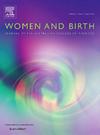助产士对他们为新毕业生提供的支持的看法和澳大利亚卫生服务的作用:助产士调查
IF 4.4
2区 医学
Q1 NURSING
引用次数: 0
摘要
问题:有证据表明,由于工作压力,新的助产士毕业生在毕业的最初几年过早地离开了这个行业。毕业生助产士对于提供未来的助产士队伍至关重要。支持新毕业生在最初几年的实践是至关重要的,以保留他们在助产专业。目的本研究的目的是探讨助产士在现有助产学研究生课程中为新毕业生提供支持的观点,以及他们对支持助产学毕业生的卫生服务流程的经验和看法。方法对澳大利亚助产士进行有目的的横断面研究。描述性统计用于分析回应的频率和百分比。Spearman相关分析用于确定变量之间的关联。对开放式问题的回答通过内容分析进行分析。总共有167名助产士回应了这项调查。超过三分之一(34.1% %)的助产士认为他们有足够的资源来支持助产学毕业生。一半(50.9 %)的助产士与助产学毕业生一起从事反思实践。大多数助产士(97% %)报告说,他们认为助产学毕业生有一个导师很重要。讨论发现缺乏保护时间来提供指导机会和支持新毕业生获得进一步的经验和教育。这些发现支持了引入正式指导计划的必要性。结论:本研究为助产士在最初几年的实践中努力支持助产学毕业生的现实提供了见解。本文章由计算机程序翻译,如有差异,请以英文原文为准。
Midwives’ perceptions of the support they provide to new graduates and the role of the health service in Australia: A survey of midwives
Problem
Evidence suggests new midwifery graduates are leaving the profession prematurely during the initial graduate years due to workplace stress.
Background
Graduate midwives are essential to provide a future midwifery workforce. Support for new graduates in the initial years of practice is essential in retaining them in the midwifery profession.
Aim
The aim of this study was to explore midwives’ perspectives of the support they provide new graduates within existing midwifery graduate programs, and their experiences and perceptions of the health service processes to support midwifery graduates.
Methods
A cross-sectional study was undertaken with a purposive sample of Australian midwives. Descriptive statistics were used to analyse frequencies and percentages of responses. Spearman’s correlational analyses were used to determine associations between the variables. Responses to open-ended questions were analysed by content analysis.
Findings
In total, 167 midwives responded to the survey. Just over a third (34.1 %) of midwives felt they had sufficient resources to support a midwifery graduate. Half (50.9 %) of the midwives engaged in reflective practice with midwifery graduates. The majority (97 %) of midwives reported that they felt it was important for midwifery graduates to have a mentor.
Discussion
A lack of protected time to provide mentoring opportunities and support new graduates to gain further experience and education was identified. These findings support the need for a formal mentorship program to be introduced.
Conclusion
This study offers insights into the perspective of midwives dealing with the realities of striving to support midwifery graduates in their initial years of practice.
求助全文
通过发布文献求助,成功后即可免费获取论文全文。
去求助
来源期刊

Women and Birth
NURSING-OBSTETRICS & GYNECOLOGY
CiteScore
7.20
自引率
13.20%
发文量
371
审稿时长
27 days
期刊介绍:
Women and Birth is the official journal of the Australian College of Midwives (ACM). It is a midwifery journal that publishes on all matters that affect women and birth, from pre-conceptual counselling, through pregnancy, birth, and the first six weeks postnatal. All papers accepted will draw from and contribute to the relevant contemporary research, policy and/or theoretical literature. We seek research papers, quality assurances papers (with ethical approval) discussion papers, clinical practice papers, case studies and original literature reviews.
Our women-centred focus is inclusive of the family, fetus and newborn, both well and sick, and covers both healthy and complex pregnancies and births. The journal seeks papers that take a woman-centred focus on maternity services, epidemiology, primary health care, reproductive psycho/physiology, midwifery practice, theory, research, education, management and leadership. We also seek relevant papers on maternal mental health and neonatal well-being, natural and complementary therapies, local, national and international policy, management, politics, economics and societal and cultural issues as they affect childbearing women and their families. Topics may include, where appropriate, neonatal care, child and family health, women’s health, related to pregnancy, birth and the postpartum, including lactation. Interprofessional papers relevant to midwifery are welcome. Articles are double blind peer-reviewed, primarily by experts in the field of the submitted work.
 求助内容:
求助内容: 应助结果提醒方式:
应助结果提醒方式:


